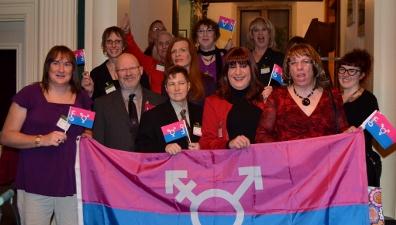The House of Commons erupted into spontaneous applause March 20 as NDP MPs celebrated with transgender community members who were in attendance when Randall Garrison’s private member’s bill, C-279, passed third reading by a vote of 149 to 137.
The bill aims to add gender identity to the list of protected grounds under the Canadian Human Rights Act.
Prime Minister Stephen Harper voted against the bill, which received the support of 18 Tories — four more than the expected 14 — who said they would vote in favour of C-279 only if gender expression were removed.
Toronto trans activist Susan Gapka dubbed the original group “the fabulous 14.”
Conservative MPs who voted in favour of the bill included John Baird, Laurie Hawn and Shelly Glover.
The bill will now go to the Senate.
Liberal leadership candidate Justin Trudeau did not attend the vote.
“It’s an important step forward,” Garrison told Xtra at the victory reception. “It represents work from trans people and organizations from all across the country.”
In his post-vote speech, Garrison thanked several organizations, including Jer’s Vision, Gender Mosaic and Egale Canada for their efforts in getting the bill passed.
“The only way we got people who might have not otherwise voted for this bill was the trans individuals and trans organizations who went to see their MPs; they wrote to their MPs, they called their MPs,” Garrison said. “I can tell you more than half a dozen of them physically said to me, ‘I’ve heard from people in my community and I’m going to vote for it.’”
Garrison also commended his assistant Sarah Manns, who is queer, for her organizational capacity in relation to the bill.
Optimism is a word to live by, Garrison said. “I believed we could do this from the beginning. I believe we can pass through the Senate. There’s a lot of work to do starting tomorrow.”
Openly gay NDP MP Craig Scott says he believes the Senate “wouldn’t dare block it. It’s pretty much a done deal.”
“Frankly, this is a combination of activism from the community and amazing work from Randall Garrison. It’s not just a matter of talking to Conservatives to get the votes; it’s how he understood how the parliamentary process had to be used to get to where we finally got,” Scott says.
Liberal MP Hedy Fry voted in favour of the bill and says the step forward for human rights reminds her of the occasions when her party added sexual orientation to the Human Rights Act and passed same-sex marriage.
“Important historic moments in Parliament make it worthwhile,” she says.
Trans athlete Kristen Worley says the bill will have a positive effect for trans athletes. She is disappointed that sport minister Bal Gosal did not vote in favour of the bill.
Worley says she has worked with athletes from India — Gosal’s birth country — who underwent gender tests and were “terribly violated.”
“My conflict with Bal Gosal is he came to Canada as a new Canadian and was supported under our Charter and Human Rights Act, and he comes to my country to take away my human rights,” Worley says. “That is very problematic.”
Worley, who is involved in the planning for the 2015 Pan American Games, says many female athletes can now outperform their male competitors. “In sport, there’s this concept of a two-poled sex society. What we’re learning is that isn’t true. It was socially driven, instead of science-driven. [Bill C-279] is a really great stepping stone for Canadian sport, but also Canadian society.”
Before the vote, Conservative MP Rob Anders presented a petition from his constituents who are concerned the bill will allow sexual predators access to women’s washrooms, hearkening back to Conservative MP Dean Allison’s comment on the floor of the House in April last year.
Conservative MP David Sweet also presented a petition from constituents who say gender-variant Canadians are currently covered in the Human Rights Act under sex.
Amanda Ryan, of Ottawa-based trans support group Gender Mosaic, is overjoyed the bill passed but is resigned to the knowledge that there’ll always be extreme views.
“I think the extreme views expressed by a lot of groups have actually worked in our favour, because it drew attention to the trans community, and we were able to talk to people and say, ‘No, this is not the case,’” she says. “When we go to the bathroom, we go to pee.”


 Why you can trust Xtra
Why you can trust Xtra


